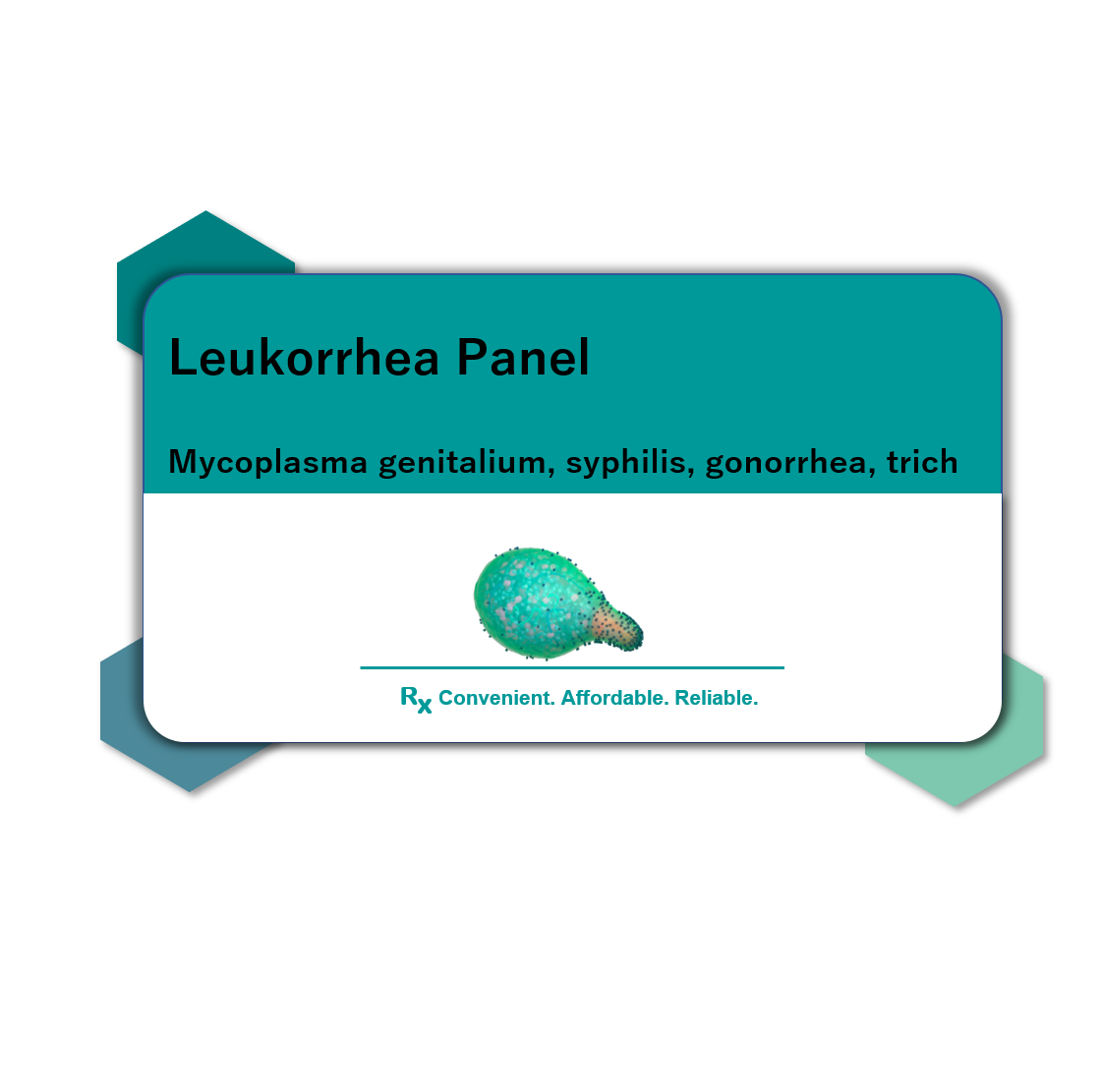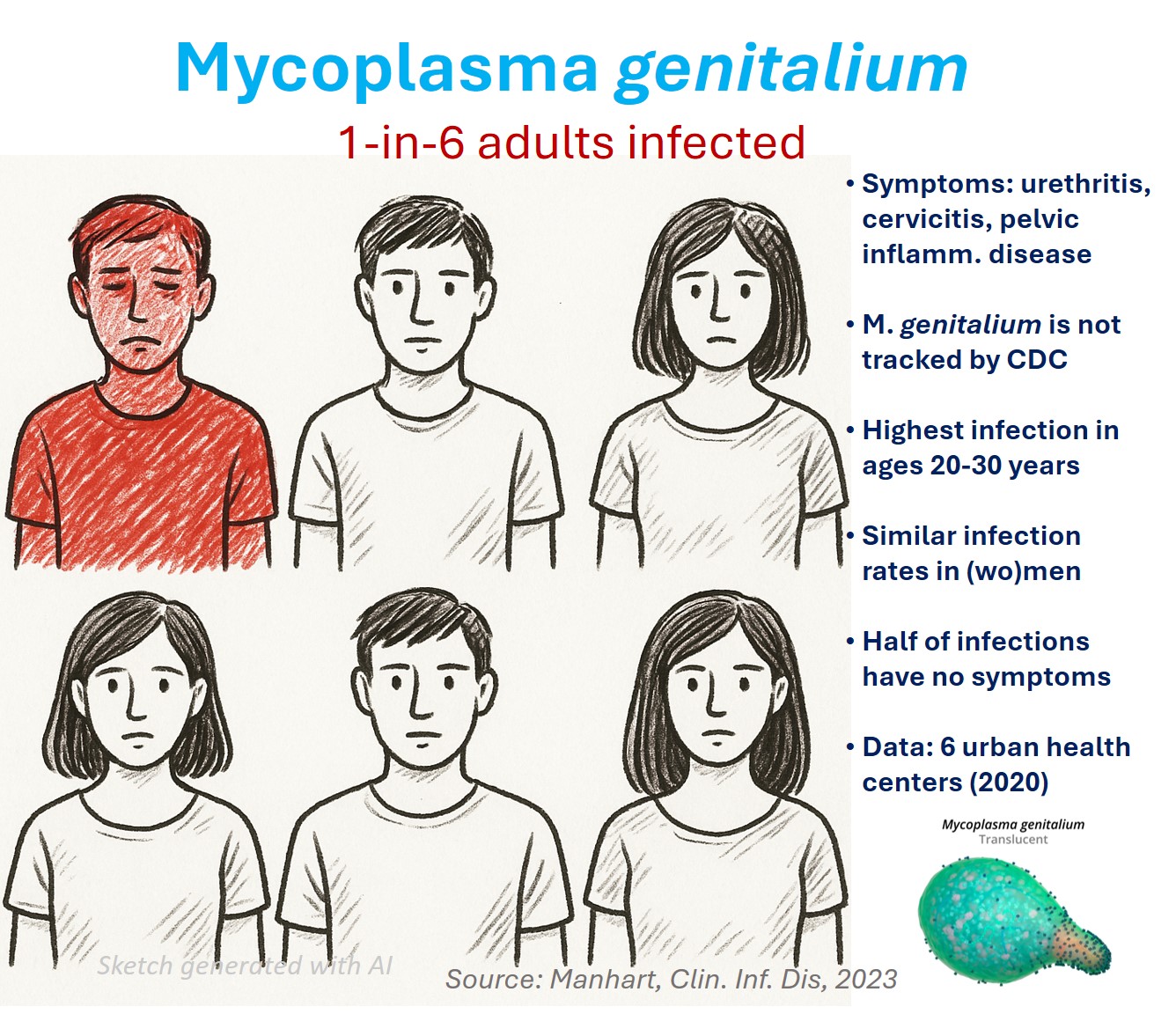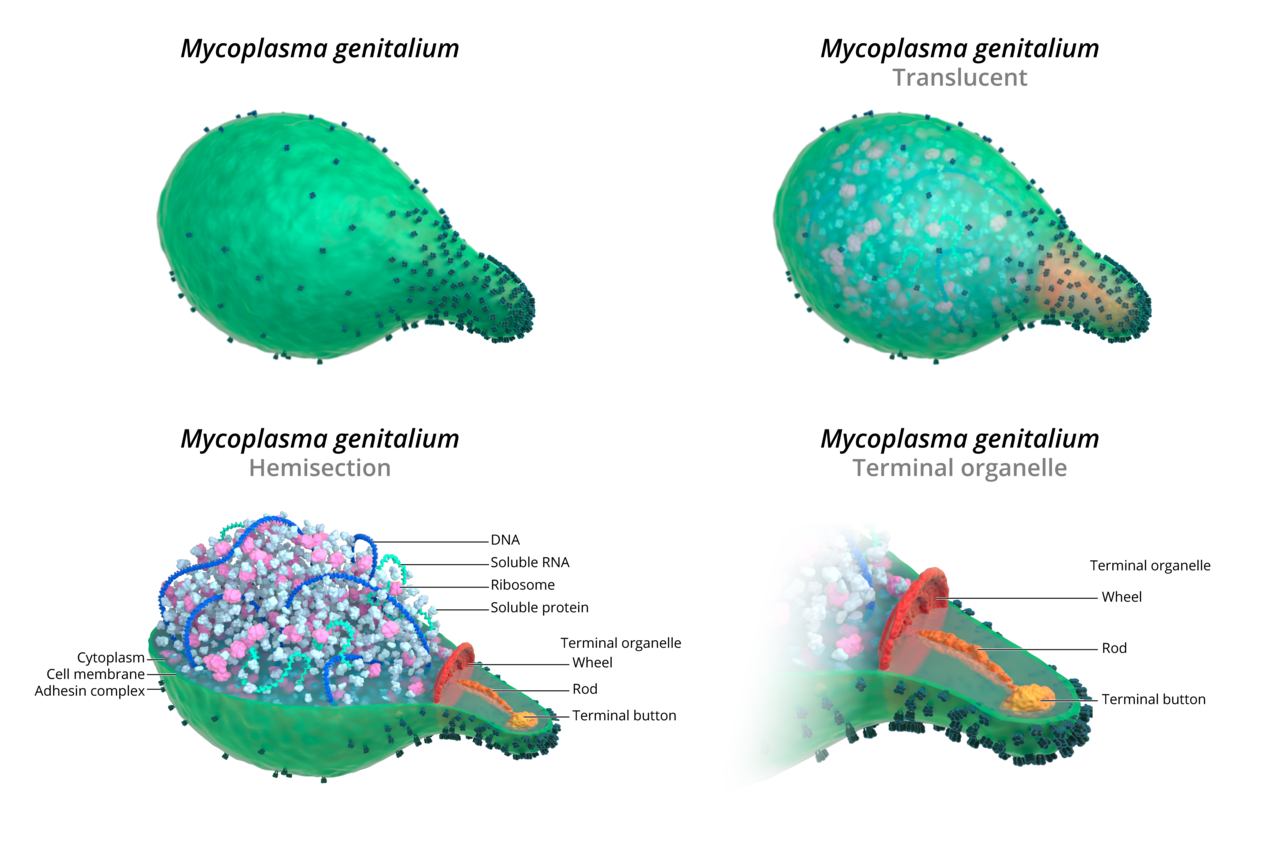

Leukorrhea is an unusual discharge and irritation during urination, mainly due to infection of genital area. In women, serious long term infection can lead to pelvic inflammatory disease, infertility, or pregnancy problems. In men, swelling of urethra and soreness can cause itching and pain.
Common causes include fungal or STD infections from M. genitalium, C. trachomatis, N. gonorrhoeae, and T. vaginalis. But it is can be easily treated with antibiotics.
This discreet at-home leukorrhea panel checks for these four infection causing bacteria, from the comfort and privacy of your home.
Our Leukorrhea Test kit - with Mycoplasma genitalium is discreet, easy, reliable, and requires just a few steps:
Order Online.
Receive The Kit And Collect Sample At Home.
Ship It Back For FREE (within US) To Our World-Class CLIA Labs.
Receive Secure, Confidential, & Easy-To-Understand Report Within Days For Your Leukorrhea STD Test Panel .
The term leukorrhea means white discharge or flow, often seen in vaginal discharge.
It can be caused by yeast infection, vaginosis (bacterial infection) and through sexually transmitted diseases.
Symptoms often include swelling and irritation around the urinary tract in men & vaginal region in women.
Such an infection can cause inflammation around genitals with conditions such as urethritis (inflammation of urine tube), cervicitis (of cervix), endometritis (of uterine lining), and salpingitis (of fallopian tubes).
Most common causes of leukorrhea include infection from Mycoplasma genitalium, Chlamydia trachomatis, Neisseria gonorrhoeae, Trichomonas vaginalis.
Some of these infections are very common and widespread in young adults (see the sketch below).
Long term impact of leukorrhea include infertility, scarring or blocking of fallopian tubes (ectopic pregnancy), pelvic inflammatory disease (PID), regular pain during sex or ovulation and menstruation.
Leukorrhea can be treated with antibiotics. However, confirmation of the infecting pathogen is required through a leukorrhea panel before treatment.

According to the National Academies, “sexual health” is a term used for a positive view of responsible and mutually consensual sex as a part of joy, family planning, love, and pleasure available to all humans.
However, infections transferred through sexual contact can cause pain and suffering to the partners and lead to blame, stigma, marginalization, and discrimination in society.
STDs have existed throughout human history. Some, e.g., syphilis, have been acquired through contact with the new world.
Sexually transmitted infections are all around us. In 2018, 1 in 5 Americans had STI at some point, that's a staggering 68 million people! Moreover, 26 million of these were new infections.
Unfortunately, these numbers have only risen further during the pandemic, compromising the health of large number of people and pushing the limits of our healthcare system.
STIs come in different forms. There are over 25 known bacteria, viruses, fungi, and parasites that can cause STIs. These include infections with HPV, HSV, HBV, HIV and Trichomonas. Most commonly known STIs are chlamydia, gonorrhea, syphilis, herpes, hepatitis B, and Trichomoniasis.
STIs often do not show any clear symptoms, especially among women. This may be the reason for them to go undiagnosed, unreported, and untreated. Over time, this can cause serious health problems including infertility, miscarriage or death of newborn, chronic pain in the pelvic area, increased risk of HIV infection, genital or oral cancers, neurological and rheumatological effects.
Sexually transmitted diseases or infections can affect anyone who is sexually active, but they disproportionately impact lesbian, gay, bisexual, transgender, and queer or questioning (LGBTQ+) individuals.
Data suggest burden of infection seems to be higher for certain minority groups, e.g., African-Americans, Native Americans, Native Alaskans, and Latinos mainly due to limited access to resources.
With recent advances in at-home testing during the pandemic, public health officials and researchers believe discreet and confidently testing with mail-in kits can help control the rising numbers.
Since 1997, highly reliable STD screening tests have become available for many sexually transmitted infections.
These NAATs (or Nucleic Acid Amplified Tests) are similar to the COVID-19 PCR tests and can accurately detect the DNA or RNA of the virus or bacteria causing the STD. PCR (polymerase chain reaction) is one of the highest accuracy test to detect the presence of a pathogen in the sample.
They have high accuracy (i.e., sensitivity and specificity) and can be performed on samples that are easy to collect and ship at room temperature. Convenience and discretion make them very appealing for such private and intimate issues.
There are mainly two types of STD tests:
STD urine tests that check the DNA or RNA of the pathogen: used for chlamydia, gonorrhea, trichomoniasis, as well as Mycoplasma genitalium, HPV, and herpes simplex virus type 2 (HSV-2); with simple urine sample.
Tests that look for antibodies against the infection: for syphilis, hepatitis, HIV, and herpes. These require a blood sample (either an at-home collected dry blood spot from finger prick or a tube of blood collected by a phlebotomist or nurse).
The report marks if the DNA or RNA and antibodies were detected in your samples.
It is generally recommended to re-test for any positive results, or clear symptoms but negative results. Since no test is perfect, this helps confirm any misses or early infections that aren't detectable yet. Also, sample collection might also impact the results.
Labs are required to report all positive results to public health authorities to monitor the spread of STDs in community.
Using a urine sample collected in a tube, the test checks DNA of the viruses for three common STDs:
Mycoplasma genitalium: DNA of the pathogen that is very difficult to culture due to no rigid cell wall (see image below).
Chlamydia: DNA of the pathogen Chlamydia trachomatis.
Gonorrhea: DNA of Neisseria gonorrhoeae.
Trichomoniasis: DNA of Trichomonas vaginalis.

The easy, discreet, and inexpensive way to get tested for some of the most common STDs is from the convenience of your home. Simply order an at home MG test kit for Mycoplasma genitalium, Chlamydia, Gonorrhea, and Trichomoniasis, collect a urine sample in a tube, mail it to our CLIA-certified labs, and find out your results in a few days.
A: Except New York and New Jersey, our tests are available in all 48 states and DC. State regulations in NY, NJ, do not allow us to ship the tests to their residents.
A: The test kit checks for bacterial infections from Mycoplasma genitalium, Chlamydia, Gonorrhea & Trichomoniasis STD Tests. It contains a urine tube and swabs to collect the sample at home, clear instructions on how to collect the sample, and a form requesting basic information such as date and time of collection. The directions are straight forward and easy to follow.
A: You will receive the kit in about 3-5 business days with a return envelope. After you ship the sample and it is received by our lab, you get the results in about 5 business days.
A: Once the results are ready, we will send a confirmation to download a confidential report from our website portal. Your test results should be easy to understand and will give necessary details. For example, it will mark whether the PCR test for each STD was positive or negative (similar to a COVID-19 PCR test). It will briefly discuss what your results mean and will suggest next steps. Please note: as per the law, all the labs are required to report positive STD test results of certain sexually transmitted infections to local public health departments for treatment and containment.
A: You can use HSA (or FSA/MSA/HRA) accounts to pay for the tests since these are prescription tests (for further confirmation, please check the IRS publication#969). However, please ensure you are not going outside your specified max and min deductible limits. We do not have the capability to process the insurance claim. Insurance plans vary by individuals, therefore we can not guarantee your HSA payment will always be processed by your plan. Please talk to your insurance provider if you have any further concerns.
A: A Leukorrhea Test Panel uses PCR (polymerase chain reaction) technology, which is the gold-standard for pathogen testing. It looks for the DNA of infection causing bacteria and considered highly accurate.
We have partnered with CLIA-certified labs that are used by physicians across the US and have decades of expertise in lab testing. These labs are regulated by the states, as well as Centers for Medicare and Medicaid Services (CMS). Many of the tests from these labs are FDA approved to ensure they meet the proper regulatory requirements. Additionally, the College of American Pathologists (CAP) requires inter-laboratory tests to ensure the ranges established by each lab do not drift or are not out of acceptable ranges. This is done by regularly testing reference samples between different labs. Finally, the labs test thousands of sample regularly, and have well established reference data to compare your results against the large pool of people tested over the years.
A: Unfortunately, no. As a lab test provider we can only test and report the results from your samples. We are not authorized to provide any medical recommendations. But we strongly encourage you to discuss the results with your doctor for next steps. It is recommended to carefully your review symptoms, health history, and other findings to see if you need to re-test or follow any other steps for complete diagnosis.
A discreet and convenient MG (Mycoplasma genitalium) test kit, ordered from the privacy of your home can help check your risk of infection and confirm whether you might be infected despite no symptoms.
An at-home Leukorrhea Test for Mycoplasma, Chlamydia, Gonorrhea & Trichomoniasis is private, confidential, and results are never shared with anyone except you. A Leukorrhea PCR panel is great for confirming a sexually acquired infection before getting treatment.
Our easy to collect swab sample avoids the inconvenience of blood draw while giving you results with high degree of confidence through a PCR (polymerase chain reaction) test.
An at-home Mycoplasma genitalium test can help you get the tested right from the comfort and privacy of your home.
An STD infection causing vaginal discharge can offer insights not only into your symptoms, but empowers you in avoiding the embarrassment of talking to someone about it.
7 key reasons to order a Leukorrhea STD Test Panel, to check infections of Mycoplasma genitalium, Chlamydia, Gonorrhea & Trichomoniasis:
No lab visits or doctor appointments
Easy to collect urine sample
World class CLIA-certified labs
Physician reviewed results
Discreet, secure, and confidential reports
Free shipping (and pre-paid return shipping within US)
Qualifies for payment using HSA/FSA
Wondering why to get tested with an Leukorrhea STD test with us?
Each of our at home STD test includes a doctor’s prescription and FREE shipping to your home address (also, FREE return shipping within US). We ship to Canada (but return shipping is not included for now).
All orders include a detailed report with your test results explained clearly in a manner that you can understand.
Our site is one of the best places for discreetly and reliably testing for multiple sexually transmitted infections as we process your tests securely at the same CLIA-Certified labs that other physicians use but no lab or doctor visit is required. Rest assured that your samples for mycoplasma, trich, gonorrhea, and chlamydia tests are being processed in a world class lab.
We offer a wide variety of tests for STDs with convenient, confidential, and reliable results at some of the lowest prices in the market.
An At-home STD Test for Mycoplasma genitalium (MG), Chlamydia, Gonorrhea & Trichomoniasis is quick and easy, can be ordered online, and doesn’t require a doctor’s visit or prescription. This saves time, money, and difficult conversation when visiting a doctor or a lab.



